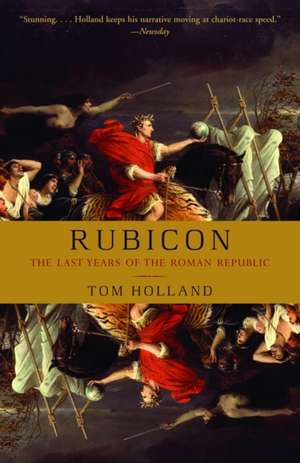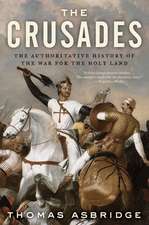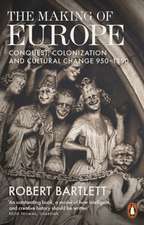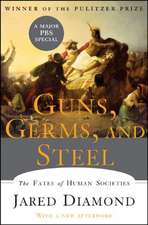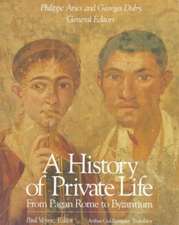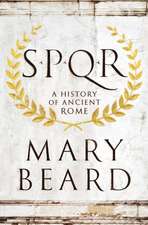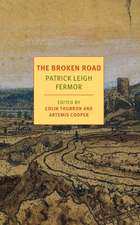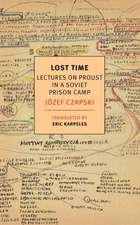Rubicon: The Last Years of the Roman Republic
Autor Tom Hollanden Limba Engleză Paperback – 28 feb 2005
| Toate formatele și edițiile | Preț | Express |
|---|---|---|
| Paperback (2) | 74.05 lei 3-5 săpt. | +38.69 lei 7-13 zile |
| Little Brown Book Group – 10 iun 2004 | 74.05 lei 3-5 săpt. | +38.69 lei 7-13 zile |
| Anchor Books – 28 feb 2005 | 120.84 lei 3-5 săpt. |
Preț: 120.84 lei
Nou
Puncte Express: 181
Preț estimativ în valută:
23.12€ • 24.09$ • 19.15£
23.12€ • 24.09$ • 19.15£
Carte disponibilă
Livrare economică 13-27 martie
Preluare comenzi: 021 569.72.76
Specificații
ISBN-13: 9781400078974
ISBN-10: 1400078970
Pagini: 408
Ilustrații: 24 PP. B&W/9 MAPS
Dimensiuni: 133 x 202 x 24 mm
Greutate: 0.47 kg
Editura: Anchor Books
ISBN-10: 1400078970
Pagini: 408
Ilustrații: 24 PP. B&W/9 MAPS
Dimensiuni: 133 x 202 x 24 mm
Greutate: 0.47 kg
Editura: Anchor Books
Notă biografică
Tom Holland is a historian of the ancient world and a translator. His books include Rubicon: The Triumph and Tragedy of the Roman Republic, Persian Fire, In the Shadow of the Sword and The Forge of Christendom. He has adapted Homer, Herodotus, Thucydides and Virgil for the BBC. In 2007, he was the winner of the Classical Association prize, awarded to "the individual who has done most to promote the study of the language, literature and civilization of Ancient Greece and Rome." He lives in London with his family.
Visit the author's website at www.tom-holland.org.
Visit the author's website at www.tom-holland.org.
Extras
1
The Paradoxical Republic
Ancestral Voices
In the beginning, before the Republic, Rome was ruled by kings. About one of these, a haughty tyrant by the name of Tarquin, an eerie tale was told. Once, in his palace, an old woman came calling on him. In her arms she carried nine books. When she offered these to Tarquin he laughed in her face, so fabulous was the price she was demanding. The old woman, making no attempt to bargain, turned and left without a word. She burned three of the books and then, reappearing before the king, offered him the remaining volumes, still at the same price as before. A second time, although with less self-assurance now, the king refused, and a second time the old woman turned and left. By now Tarquin had grown nervous of what he might be turning down, and so when the mysterious crone reappeared, this time holding only three books, he hurriedly bought them, even though he had to pay the price originally demanded for all nine. Taking her money, the old woman then vanished, never to be seen again.
Who had she been? Her books proved to contain prophecies of such potency that the Romans soon realized that only one woman could possibly have been their author--the Sibyl. Yet this was an identification that only begged further questions, for the legends told of the Sibyl were strange and puzzling. On the presumption that she had foretold the Trojan War, men debated whether she was a compound of ten prophetesses, or immortal, or destined to live a thousand years. Some--the more sophisticated--even wondered whether she existed at all. In fact, only two things could be asserted with any real confidence--that her books, inscribed with spidery and antique Greek, certainly existed, and that within them could be read the pattern of events that were to come. The Romans, thanks to Tarquin's belated eye for a bargain, found themselves with a window to the future of the world.
Not that this helped Tarquin much. In 509 bc he succumbed to a palace coup. Kings had been ruling in Rome for more than two hundred years, ever since the city's foundation, but Tarquin, the seventh in line, would also be the last.* With his expulsion, the monarchy itself was overthrown, and, in its place, a free republic proclaimed. From then on, the title of "king" would be regarded by the Roman people with an almost pathological hatred, to be shrunk from and shuddered at whenever mentioned. Liberty had been the watchword of the coup against Tarquin, and liberty, the liberty of a city that had no master, was now consecrated as the birthright and measure of every citizen. To preserve it from the ambitions of future would-be tyrants, the founders of the Republic settled upon a remarkable formula. Carefully, they divided the powers of the exiled Tarquin between two magistrates, both elected, neither permitted to serve for longer than a year. These were the consuls, and their presence at the head of their fellow citizens, the one guarding against the ambitions of the other, was a stirring expression of the Republic's guiding principle--that never again should one man be permitted to rule supreme in Rome. Yet, startling though the innovation of the consulship appeared, it was not so radical as to separate the Romans entirely from their past. The monarchy might have been abolished, but very little else. The roots of the new Republic reached far back in time--often very far back indeed. The consuls themselves, as a privilege of their office, bordered their togas with the purple of kings. When they consulted the auspices they did so according to rites that predated the very foundation of Rome. And then, of course, most fabulous of all, there were the books left behind by the exiled Tarquin, the three mysterious rolls of prophecy, the writings of the ancient and quite possibly timeless Sibyl.
So sensitive was the information provided by these that access to them was strictly regulated as a secret of the state. Citizens found copying them would be sewn into a sack and dropped into the sea. Only in the most perilous of circumstances, when fearsome prodigies warned the Republic of looming catastrophe, was it permitted to consult the books at all. Then, once every alternative had been exhausted, specially appointed magistrates would be mandated to climb to the temple of Jupiter, where the books were kept in conditions of the tightest security. The scrolls would be spread out. Fingers would trace the faded lines of Greek. Prophecies would be deciphered, and advice taken on how best to appease the angered heavens.
And advice was always found. The Romans, being a people as practical as they were devout, had no patience with fatalism. They were interested in knowing the future only because they believed that it could then better be kept at bay. Showers of blood, chasms spitting fire, mice eating gold: terrifying prodigies such as these were regarded as the equivalent of bailiffs' duns, warnings to the Roman people that they stood in arrears with the gods. To get back in credit might require the introduction of a foreign cult to the city, the worship of a divinity who had hitherto been unknown. More typically, it would inspire retrenchment, as the magistrates desperately sought to identify the traditions that might have been neglected. Restore the past, the way that things had always been, and the safety of the Republic would be assured.
This was a presumption buried deep in the soul of every Roman. In the century that followed its establishment, the Republic was repeatedly racked by further social convulsions, by demands from the mass of citizens for expanded civic rights, and by continued constitutional reforms--and yet throughout this turbulent period of upheaval, the Roman people never ceased to affect a stern distaste for change. Novelty, to the citizens of the Republic, had sinister connotations. Pragmatic as they were, they might accept innovation if it were dressed up as the will of the gods or an ancient custom, but never for its own sake. Conservative and flexible in equal measure, the Romans kept what worked, adapted what had failed, and preserved as sacred lumber what had become redundant. The Republic was both a building site and a junkyard. Rome's future was constructed amid the jumble of her past.
The Romans themselves, far from seeing this as a paradox, took it for granted. How else were they to invest in their city save by holding true to the customs of their ancestors? Foreign analysts, who tended to regard the Romans' piety as "superstition,"1 and interpreted it as a subterfuge played on the masses by a cynical ruling class, misread its essence. The Republic was not like other states. While the cities of the Greeks were regularly shattered by civil wars and revolutions, Rome proved herself impervious to such disasters. Not once, despite all the social upheavals of the Republic's first century of existence, had the blood of her own citizens been spilled on her streets. How typical of the Greeks to reduce the ideal of shared citizenship to sophistry! To a Roman, nothing was more sacred or cherished. After all, it was what defined him. Public business--res publica--was what "republic" meant. Only by seeing himself reflected in the gaze of his fellows could a Roman truly know himself a man.
And by hearing his name on every tongue. The good citizen, in the Republic, was the citizen acknowledged to be good. The Romans recognized no difference between moral excellence and reputation, having the same word, honestas, for both. The approval of the entire city was the ultimate, the only, test of worth. This was why, whenever resentful citizens took to the streets, it would be to demand access to yet more honors and glory. Civil unrest would invariably inspire the establishment of a new magistracy: the aedileship and tribunate in 494, the quaestorship in 447, the praetorship in 367. The more posts there were, the greater the range of responsibilities; the greater the range of responsibilities, the broader the opportunities for achievement and approbation. Praise was what every citizen most desired--just as public shame was his ultimate dread. Not laws but the consciousness of always being watched was what prevented a Roman's sense of competition from degenerating into selfish ambition. Gruelling and implacable though the contest to excel invariably was, there could be no place in it for ill-disciplined vainglory. To place personal honor above the interests of the entire community was the behavior of a barbarian--or worse yet, a king.
In their relations with their fellows, then, the citizens of the Republic were schooled to temper their competitive instincts for the common good. In their relations with other states, however, no such inhibitions cramped them. "More than any other nation, the Romans have sought out glory and been greedy for praise."2 The consequences for their neighbors of this hunger for honor were invariably devastating. The legions' combination of efficiency and ruthlessness was something for which few opponents found themselves prepared. When the Romans were compelled by defiance to take a city by storm, it was their practice to slaughter every living creature they found. Rubble left behind by the legionaries could always be distinguished by the way in which severed dogs' heads or the dismembered limbs of cattle would lie strewn among the human corpses.3 The Romans killed to inspire terror, not in a savage frenzy but as the disciplined components of a fighting machine. The courage they brought to service in the legions, steeled by pride in their city and faith in her destiny, was an emotion that every citizen was brought up to share. Something uniquely lethal--and, to the Romans, glorious--marked their way of war.
Even so, it took time for the other states of Italy to wake up to the nature of the predator in their midst. For the first century of the Republic's existence the Romans found it a struggle to establish their supremacy over cities barely ten miles from their own gates. Yet even the deadliest carnivore must have its infancy, and the Romans, as they raided cattle and skirmished with petty hill tribes, were developing the instincts required to dominate and kill. By the 360s bc they had established their city as the mistress of central Italy. In the following decades they marched north and south, crushing opposition wherever they met it. By the 260s, with startling speed, they had mastered the entire peninsula. Honor, of course, had demanded nothing less. To states that humbly acknowledged their superiority, the Romans would grant such favors as a patron condescends to grant his clients, but to those who defied them, only ceaseless combat. No Roman could tolerate the prospect of his city losing face. Rather than endure it, he would put up with any amount of suffering, go to any lengths.
The time soon came when the Republic had to demonstrate this in a literal struggle to the death. The wars with Carthage were the most terrible it ever fought. A city of Semitic settlers on the North African coast, dominating the trade routes of the western Mediterranean, Carthage possessed resources at least as great as Rome's. Although predominantly a maritime power, she had indulged herself for centuries with bouts of warfare against the Greek cities of Sicily. Now, poised beyond the Straits of Messina, the Romans represented an ominous but intriguing new factor in Sicily's military equation. Predictably, the Greeks on the island could not resist embroiling the Republic in their perennial squabbles with Carthage. Equally predictably, once invited in, the Republic refused to play by the rules. In 264 Rome transformed what had been a minor dispute over treaty rights into a total war. Despite a lack of any naval tradition, and the loss of fleet after fleet to enemy action or storms, the Romans endured over two decades of appalling casualties to bring Carthage, at last, to defeat. By the terms of the peace treaty forced on them, the Carthaginians undertook a complete withdrawal from Sicily. Without ever having intended it, Rome found herself with the nucleus of an overseas empire. In 227 Sicily was constituted as the first Roman province.
The theater of the Republic's campaigning was soon to grow even wider. Carthage had been defeated, but not smashed. With Sicily lost, she next turned her imperial attentions to Spain. Braving the murderous tribes who swarmed everywhere in the mountains, the Carthaginians began to prospect for precious metals. The flood of wealth from their mines soon enabled them to contemplate resuming hostilities. Carthage's best generals were no longer under any illusions as to the nature of the enemy they faced in the Republic. Total war would have to be met in kind, and victory would be impossible unless Roman power were utterly destroyed.
It was to achieve this that Hannibal, in 218, led a Carthaginian army from Spain, through southern Gaul and over the Alps. Displaying a mastery of strategy and tactics far beyond that of his opponents, he brought three Roman armies to sensational defeat. In the third of his victories, at Cannae, Hannibal wiped out eight legions, the worst military disaster in the Republic's history. By every convention and expectation of contemporary warfare, Rome should have followed it by acknowledging Hannibal's triumph, and attempting to sue for peace. But in the face of catastrophe, she showed only continued defiance. Naturally, at such a moment, the Romans turned for guidance to the prophecies of the Sibyl. These prescribed that two Gauls and two Greeks be buried alive in the city's marketplace. The magistrates duly followed the Sibyl's advice. With this shocking act of barbarism, the Roman people demonstrated that there was nothing they would not countenance to preserve their city's freedom. The only alternative to liberty--as it had always been--was death.
And grimly, year by year, the Republic hauled itself back from the brink. More armies were raised; Sicily was held; the legions conquered Carthage's empire in Spain. A decade and a half after Cannae Hannibal faced another Roman army, but this time on African soil. He was defeated. Carthage no longer had the manpower to continue the struggle, and when her conqueror's terms were delivered, Hannibal advised his compatriots to accept them. Unlike the Republic after Cannae, he preferred not to risk his city's obliteration. Despite this, the Romans never forgot that in Hannibal, in the scale of his exertions, in the scope of his ambition, they had met the enemy who was most like themselves. Centuries later statues of him were still to be found standing in Rome. And even after they had reduced Carthage to an impotent rump, confiscating her provinces, her fleet, her celebrated war-elephants, the Romans continued to dread a Carthaginian recovery. Such hatred was the greatest compliment they could pay a foreign state. Carthage could not be trusted in her submission. The Romans looked into their own souls and attributed the implacability they found there to their greatest foe.
From the Hardcover edition.
The Paradoxical Republic
Ancestral Voices
In the beginning, before the Republic, Rome was ruled by kings. About one of these, a haughty tyrant by the name of Tarquin, an eerie tale was told. Once, in his palace, an old woman came calling on him. In her arms she carried nine books. When she offered these to Tarquin he laughed in her face, so fabulous was the price she was demanding. The old woman, making no attempt to bargain, turned and left without a word. She burned three of the books and then, reappearing before the king, offered him the remaining volumes, still at the same price as before. A second time, although with less self-assurance now, the king refused, and a second time the old woman turned and left. By now Tarquin had grown nervous of what he might be turning down, and so when the mysterious crone reappeared, this time holding only three books, he hurriedly bought them, even though he had to pay the price originally demanded for all nine. Taking her money, the old woman then vanished, never to be seen again.
Who had she been? Her books proved to contain prophecies of such potency that the Romans soon realized that only one woman could possibly have been their author--the Sibyl. Yet this was an identification that only begged further questions, for the legends told of the Sibyl were strange and puzzling. On the presumption that she had foretold the Trojan War, men debated whether she was a compound of ten prophetesses, or immortal, or destined to live a thousand years. Some--the more sophisticated--even wondered whether she existed at all. In fact, only two things could be asserted with any real confidence--that her books, inscribed with spidery and antique Greek, certainly existed, and that within them could be read the pattern of events that were to come. The Romans, thanks to Tarquin's belated eye for a bargain, found themselves with a window to the future of the world.
Not that this helped Tarquin much. In 509 bc he succumbed to a palace coup. Kings had been ruling in Rome for more than two hundred years, ever since the city's foundation, but Tarquin, the seventh in line, would also be the last.* With his expulsion, the monarchy itself was overthrown, and, in its place, a free republic proclaimed. From then on, the title of "king" would be regarded by the Roman people with an almost pathological hatred, to be shrunk from and shuddered at whenever mentioned. Liberty had been the watchword of the coup against Tarquin, and liberty, the liberty of a city that had no master, was now consecrated as the birthright and measure of every citizen. To preserve it from the ambitions of future would-be tyrants, the founders of the Republic settled upon a remarkable formula. Carefully, they divided the powers of the exiled Tarquin between two magistrates, both elected, neither permitted to serve for longer than a year. These were the consuls, and their presence at the head of their fellow citizens, the one guarding against the ambitions of the other, was a stirring expression of the Republic's guiding principle--that never again should one man be permitted to rule supreme in Rome. Yet, startling though the innovation of the consulship appeared, it was not so radical as to separate the Romans entirely from their past. The monarchy might have been abolished, but very little else. The roots of the new Republic reached far back in time--often very far back indeed. The consuls themselves, as a privilege of their office, bordered their togas with the purple of kings. When they consulted the auspices they did so according to rites that predated the very foundation of Rome. And then, of course, most fabulous of all, there were the books left behind by the exiled Tarquin, the three mysterious rolls of prophecy, the writings of the ancient and quite possibly timeless Sibyl.
So sensitive was the information provided by these that access to them was strictly regulated as a secret of the state. Citizens found copying them would be sewn into a sack and dropped into the sea. Only in the most perilous of circumstances, when fearsome prodigies warned the Republic of looming catastrophe, was it permitted to consult the books at all. Then, once every alternative had been exhausted, specially appointed magistrates would be mandated to climb to the temple of Jupiter, where the books were kept in conditions of the tightest security. The scrolls would be spread out. Fingers would trace the faded lines of Greek. Prophecies would be deciphered, and advice taken on how best to appease the angered heavens.
And advice was always found. The Romans, being a people as practical as they were devout, had no patience with fatalism. They were interested in knowing the future only because they believed that it could then better be kept at bay. Showers of blood, chasms spitting fire, mice eating gold: terrifying prodigies such as these were regarded as the equivalent of bailiffs' duns, warnings to the Roman people that they stood in arrears with the gods. To get back in credit might require the introduction of a foreign cult to the city, the worship of a divinity who had hitherto been unknown. More typically, it would inspire retrenchment, as the magistrates desperately sought to identify the traditions that might have been neglected. Restore the past, the way that things had always been, and the safety of the Republic would be assured.
This was a presumption buried deep in the soul of every Roman. In the century that followed its establishment, the Republic was repeatedly racked by further social convulsions, by demands from the mass of citizens for expanded civic rights, and by continued constitutional reforms--and yet throughout this turbulent period of upheaval, the Roman people never ceased to affect a stern distaste for change. Novelty, to the citizens of the Republic, had sinister connotations. Pragmatic as they were, they might accept innovation if it were dressed up as the will of the gods or an ancient custom, but never for its own sake. Conservative and flexible in equal measure, the Romans kept what worked, adapted what had failed, and preserved as sacred lumber what had become redundant. The Republic was both a building site and a junkyard. Rome's future was constructed amid the jumble of her past.
The Romans themselves, far from seeing this as a paradox, took it for granted. How else were they to invest in their city save by holding true to the customs of their ancestors? Foreign analysts, who tended to regard the Romans' piety as "superstition,"1 and interpreted it as a subterfuge played on the masses by a cynical ruling class, misread its essence. The Republic was not like other states. While the cities of the Greeks were regularly shattered by civil wars and revolutions, Rome proved herself impervious to such disasters. Not once, despite all the social upheavals of the Republic's first century of existence, had the blood of her own citizens been spilled on her streets. How typical of the Greeks to reduce the ideal of shared citizenship to sophistry! To a Roman, nothing was more sacred or cherished. After all, it was what defined him. Public business--res publica--was what "republic" meant. Only by seeing himself reflected in the gaze of his fellows could a Roman truly know himself a man.
And by hearing his name on every tongue. The good citizen, in the Republic, was the citizen acknowledged to be good. The Romans recognized no difference between moral excellence and reputation, having the same word, honestas, for both. The approval of the entire city was the ultimate, the only, test of worth. This was why, whenever resentful citizens took to the streets, it would be to demand access to yet more honors and glory. Civil unrest would invariably inspire the establishment of a new magistracy: the aedileship and tribunate in 494, the quaestorship in 447, the praetorship in 367. The more posts there were, the greater the range of responsibilities; the greater the range of responsibilities, the broader the opportunities for achievement and approbation. Praise was what every citizen most desired--just as public shame was his ultimate dread. Not laws but the consciousness of always being watched was what prevented a Roman's sense of competition from degenerating into selfish ambition. Gruelling and implacable though the contest to excel invariably was, there could be no place in it for ill-disciplined vainglory. To place personal honor above the interests of the entire community was the behavior of a barbarian--or worse yet, a king.
In their relations with their fellows, then, the citizens of the Republic were schooled to temper their competitive instincts for the common good. In their relations with other states, however, no such inhibitions cramped them. "More than any other nation, the Romans have sought out glory and been greedy for praise."2 The consequences for their neighbors of this hunger for honor were invariably devastating. The legions' combination of efficiency and ruthlessness was something for which few opponents found themselves prepared. When the Romans were compelled by defiance to take a city by storm, it was their practice to slaughter every living creature they found. Rubble left behind by the legionaries could always be distinguished by the way in which severed dogs' heads or the dismembered limbs of cattle would lie strewn among the human corpses.3 The Romans killed to inspire terror, not in a savage frenzy but as the disciplined components of a fighting machine. The courage they brought to service in the legions, steeled by pride in their city and faith in her destiny, was an emotion that every citizen was brought up to share. Something uniquely lethal--and, to the Romans, glorious--marked their way of war.
Even so, it took time for the other states of Italy to wake up to the nature of the predator in their midst. For the first century of the Republic's existence the Romans found it a struggle to establish their supremacy over cities barely ten miles from their own gates. Yet even the deadliest carnivore must have its infancy, and the Romans, as they raided cattle and skirmished with petty hill tribes, were developing the instincts required to dominate and kill. By the 360s bc they had established their city as the mistress of central Italy. In the following decades they marched north and south, crushing opposition wherever they met it. By the 260s, with startling speed, they had mastered the entire peninsula. Honor, of course, had demanded nothing less. To states that humbly acknowledged their superiority, the Romans would grant such favors as a patron condescends to grant his clients, but to those who defied them, only ceaseless combat. No Roman could tolerate the prospect of his city losing face. Rather than endure it, he would put up with any amount of suffering, go to any lengths.
The time soon came when the Republic had to demonstrate this in a literal struggle to the death. The wars with Carthage were the most terrible it ever fought. A city of Semitic settlers on the North African coast, dominating the trade routes of the western Mediterranean, Carthage possessed resources at least as great as Rome's. Although predominantly a maritime power, she had indulged herself for centuries with bouts of warfare against the Greek cities of Sicily. Now, poised beyond the Straits of Messina, the Romans represented an ominous but intriguing new factor in Sicily's military equation. Predictably, the Greeks on the island could not resist embroiling the Republic in their perennial squabbles with Carthage. Equally predictably, once invited in, the Republic refused to play by the rules. In 264 Rome transformed what had been a minor dispute over treaty rights into a total war. Despite a lack of any naval tradition, and the loss of fleet after fleet to enemy action or storms, the Romans endured over two decades of appalling casualties to bring Carthage, at last, to defeat. By the terms of the peace treaty forced on them, the Carthaginians undertook a complete withdrawal from Sicily. Without ever having intended it, Rome found herself with the nucleus of an overseas empire. In 227 Sicily was constituted as the first Roman province.
The theater of the Republic's campaigning was soon to grow even wider. Carthage had been defeated, but not smashed. With Sicily lost, she next turned her imperial attentions to Spain. Braving the murderous tribes who swarmed everywhere in the mountains, the Carthaginians began to prospect for precious metals. The flood of wealth from their mines soon enabled them to contemplate resuming hostilities. Carthage's best generals were no longer under any illusions as to the nature of the enemy they faced in the Republic. Total war would have to be met in kind, and victory would be impossible unless Roman power were utterly destroyed.
It was to achieve this that Hannibal, in 218, led a Carthaginian army from Spain, through southern Gaul and over the Alps. Displaying a mastery of strategy and tactics far beyond that of his opponents, he brought three Roman armies to sensational defeat. In the third of his victories, at Cannae, Hannibal wiped out eight legions, the worst military disaster in the Republic's history. By every convention and expectation of contemporary warfare, Rome should have followed it by acknowledging Hannibal's triumph, and attempting to sue for peace. But in the face of catastrophe, she showed only continued defiance. Naturally, at such a moment, the Romans turned for guidance to the prophecies of the Sibyl. These prescribed that two Gauls and two Greeks be buried alive in the city's marketplace. The magistrates duly followed the Sibyl's advice. With this shocking act of barbarism, the Roman people demonstrated that there was nothing they would not countenance to preserve their city's freedom. The only alternative to liberty--as it had always been--was death.
And grimly, year by year, the Republic hauled itself back from the brink. More armies were raised; Sicily was held; the legions conquered Carthage's empire in Spain. A decade and a half after Cannae Hannibal faced another Roman army, but this time on African soil. He was defeated. Carthage no longer had the manpower to continue the struggle, and when her conqueror's terms were delivered, Hannibal advised his compatriots to accept them. Unlike the Republic after Cannae, he preferred not to risk his city's obliteration. Despite this, the Romans never forgot that in Hannibal, in the scale of his exertions, in the scope of his ambition, they had met the enemy who was most like themselves. Centuries later statues of him were still to be found standing in Rome. And even after they had reduced Carthage to an impotent rump, confiscating her provinces, her fleet, her celebrated war-elephants, the Romans continued to dread a Carthaginian recovery. Such hatred was the greatest compliment they could pay a foreign state. Carthage could not be trusted in her submission. The Romans looked into their own souls and attributed the implacability they found there to their greatest foe.
From the Hardcover edition.
Recenzii
“Stunning. . . . Holland keeps his narrative moving at chariot-race speed.” –Newsday
“This gripping narrative resurrects some of the half-forgotten personalities and events that shaped who we are. . . . It enables the reader to relive the slow, bloodstained collapse of a system, not only as a fascinating drama in its own right but as a morality tale.” –Anthony Everitt, author of Cicero
“A fascinating picture of Roman city life. . . . In every aspect of this story, Holland expertly makes the Romans, so alien and yet so familiar, relevant to us.” –Los Angeles Times
“Tremendously intelligent, vibrant and witty.” –The Washington Times
“The crispest and most compelling account. . . . A historical thrill ride.” –The Seattle Times
“Splendid. . . . Rich. . . . Holland writes history with a sense of immediacy, and with the passion and pacing of a novelist. . . . His absorbing, witty narrative captures the scope and drama of the republic and shapes its labyrinthine elements into a single continuum.” –Houston Chronicle
“[A] book that really held me, in fact, obsessed me. . . . Narrative history at its best.” –Ian McEwan, The Guardian, Books of the Year
“Very readable. . . . Witty, literate. . . . [It] outlines as no other story in history can the perils and misadventures that bring down democratic governments.” –St. Petersburg Times
“Gripping and hugely entertaining. . . . It is a story crammed with drama and spectacle, but the real attraction of Holland’s book is the wit and contemporary sensibility that he brings to his often bloody tale.” –The Sunday Times (London), Top 5 History Books of the Year
“Lucid, stylish and witty, and interesting in its analysis. . . . Informative, balanced, and accessible, Holland’s compelling brand of narrative history is a praiseworthy rendition of one of the most complex periods in history.” –BookPage
“A lively, popularly written history. . . . Holland’s book is full of memorable characters.” –World
“Explosive stuff. . . . Seriously intelligent history written with élan and gusto.” –BBC History Magazine
“Lively, readable, briskly paced. . . . Thoroughly grounded in the relevant source material. . . . Seamless, forward-moving. . . . Not only a gripping account of the Roman past, but an important perspective on the current American moment. . . . Rubicon succeeds brilliantly.” –Claremont Review of Books
“Richly resonant. . . . Ancient history lives in this vivid chronicle.” –Booklist (starred review)
“A terrific read and a remarkable piece of scholarship. As an introduction to Roman history, it is unlikely to be bettered.” –Daily Mail
“Holland brings a novelist’s eye to the ancient republic’s collapse. . . . [He] also draws a fascinating portrait of the social life of Rome and the republic in the first century B.C. . . . Written with flair, wit and solid historical research, Rubicon is grand history and grandly entertaining.” –Flint Journal
“A vivid social portrait of the Roman world.” –Sunday Telegraph
“This gripping narrative resurrects some of the half-forgotten personalities and events that shaped who we are. . . . It enables the reader to relive the slow, bloodstained collapse of a system, not only as a fascinating drama in its own right but as a morality tale.” –Anthony Everitt, author of Cicero
“A fascinating picture of Roman city life. . . . In every aspect of this story, Holland expertly makes the Romans, so alien and yet so familiar, relevant to us.” –Los Angeles Times
“Tremendously intelligent, vibrant and witty.” –The Washington Times
“The crispest and most compelling account. . . . A historical thrill ride.” –The Seattle Times
“Splendid. . . . Rich. . . . Holland writes history with a sense of immediacy, and with the passion and pacing of a novelist. . . . His absorbing, witty narrative captures the scope and drama of the republic and shapes its labyrinthine elements into a single continuum.” –Houston Chronicle
“[A] book that really held me, in fact, obsessed me. . . . Narrative history at its best.” –Ian McEwan, The Guardian, Books of the Year
“Very readable. . . . Witty, literate. . . . [It] outlines as no other story in history can the perils and misadventures that bring down democratic governments.” –St. Petersburg Times
“Gripping and hugely entertaining. . . . It is a story crammed with drama and spectacle, but the real attraction of Holland’s book is the wit and contemporary sensibility that he brings to his often bloody tale.” –The Sunday Times (London), Top 5 History Books of the Year
“Lucid, stylish and witty, and interesting in its analysis. . . . Informative, balanced, and accessible, Holland’s compelling brand of narrative history is a praiseworthy rendition of one of the most complex periods in history.” –BookPage
“A lively, popularly written history. . . . Holland’s book is full of memorable characters.” –World
“Explosive stuff. . . . Seriously intelligent history written with élan and gusto.” –BBC History Magazine
“Lively, readable, briskly paced. . . . Thoroughly grounded in the relevant source material. . . . Seamless, forward-moving. . . . Not only a gripping account of the Roman past, but an important perspective on the current American moment. . . . Rubicon succeeds brilliantly.” –Claremont Review of Books
“Richly resonant. . . . Ancient history lives in this vivid chronicle.” –Booklist (starred review)
“A terrific read and a remarkable piece of scholarship. As an introduction to Roman history, it is unlikely to be bettered.” –Daily Mail
“Holland brings a novelist’s eye to the ancient republic’s collapse. . . . [He] also draws a fascinating portrait of the social life of Rome and the republic in the first century B.C. . . . Written with flair, wit and solid historical research, Rubicon is grand history and grandly entertaining.” –Flint Journal
“A vivid social portrait of the Roman world.” –Sunday Telegraph
Descriere
Descriere de la o altă ediție sau format:
'The Book that really held me, in fact, obsessed me, was Rubicon . . . This is narrative history at its best. Bloody and labyrinthine political intrigue and struggle, brilliant oratory, amazing feats of conquest and cruelty' Ian McEwan, Books of the Year, Guardian
'The Book that really held me, in fact, obsessed me, was Rubicon . . . This is narrative history at its best. Bloody and labyrinthine political intrigue and struggle, brilliant oratory, amazing feats of conquest and cruelty' Ian McEwan, Books of the Year, Guardian
